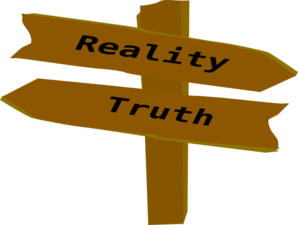It's been a long time since I posted. I've been busy thinking about how we can possibly know what is true and what is not. And I'm stumped. One scholar says this, another seemingly equally valid scholar disagrees. One scientific study may demonstrate one thing, but if a person does further reading, research can usually be found that contradicts the results of the first study...Which one is true? And how can I, a mere common person without formal scholarly or scientific training, hope to ascertain what is a reliable source among many which seem valid?
The same holds true in Christianity. There's been a search for the historical Jesus, and many respected scholars have widely differing viewpoints. Which is true? There is even a whole field of study (epistemology) that studies how we know what we know, and they don't even seem to know how we can know what we know...
People who study consciousness and the brain maintain that we don't actually perceive the world around us as it really is. They say, for example, that there is no actual color green, but that light (which has no color) is filtered by our eyes in a certain way that we perceive (with the limited tools at our disposal) as the color green.
Dr. David Eagleman "is a neuroscientist and a New York Times bestselling author. He directs the Laboratory for Perception and Action and the Initiative on Neuroscience and Law at Baylor College of Medicine. He is best known for his work on time perception, synesthesia, and neurolaw." I recently listened to a Brain Science Podcast interview with Dr. Eagleman which focused on his most recent book, Incognito: The Secret Lives of the Brain. (As much as I can ascertain, both Dr. Eagleman and Brain Science Podcast are reputable sources :-). Dr. Eagleman shared the following information:
Dr. David Eagleman "is a neuroscientist and a New York Times bestselling author. He directs the Laboratory for Perception and Action and the Initiative on Neuroscience and Law at Baylor College of Medicine. He is best known for his work on time perception, synesthesia, and neurolaw." I recently listened to a Brain Science Podcast interview with Dr. Eagleman which focused on his most recent book, Incognito: The Secret Lives of the Brain. (As much as I can ascertain, both Dr. Eagleman and Brain Science Podcast are reputable sources :-). Dr. Eagleman shared the following information:
"In the book I spend a lot of time just sort of deconstructing reality piece by piece, and showing that, as we want to go on this journey of exploring what the heck we’re made out of, the first thing to do is to recognize that what you’re seeing out there is not actually reality. You’re not sort of opening your eyes, and voila, there’s the world. Instead, your brain constructs the world. Your brain is trapped in darkness inside of your skull, and all it ever sees are electrical and chemical signals. So all the colors you see, and so on, that doesn’t really exist; that’s an interpretation by your brain.
"Just take as a quick example the fact that your eyes are always moving around in these rapid darting movements; and if you did that with a handheld video camera, it would look like a drunk person holding it, and the world would look very shaky. But our world doesn’t look very shaky, because all we’re actually doing is seeing an internal model of the world; we’re not seeing what’s out there, we’re seeing just our internal model of it. And that’s why, when you move your eyes around, all you’re doing is updating that model. And for that matter, when you blink your eyes and there are 80 milliseconds of blackness there, you don’t notice that, either. Because it’s not actually about what’s coming in the eyes; it’s about your internal construction….
"…[There’s also what’s called the ‘illusion of truth’ - where people think something’s true just because they have heard it before]. You give people statements to rate the truth value of, and then you bring them back a while later and you give them more statements to say whether they’re true or false, and so on. But it turns out that if you repeat some of the statements from the first time to the second time, just because the people have heard them before, whether or not it’s true and whether or not they even marked it as false last time, because they’re hearing it again—unconsciously they know they’ve heard it before—they’re more likely to rate it as true now.
Dr. Eagleman confirms some other authors I have read on our perceptions of reality. I have actually noticed this "illusion of truth" in myself - the tendency to think I know about a subject because I've done some reading about it previously. (I'm glad to know that's normal - I think!) But I guess the questions I'm really trying to answer are: What is the nature of Reality? How can I know what's true? How can I tell what's real? And the answer, as near as I can tell, is that we really don't know. Much of the time, things may not be as they appear to us with the limited tools of perception that we are equipped with. So how can I, an untrained person, know what's true, or even which source is reliable? Anybody out there have any advice?
